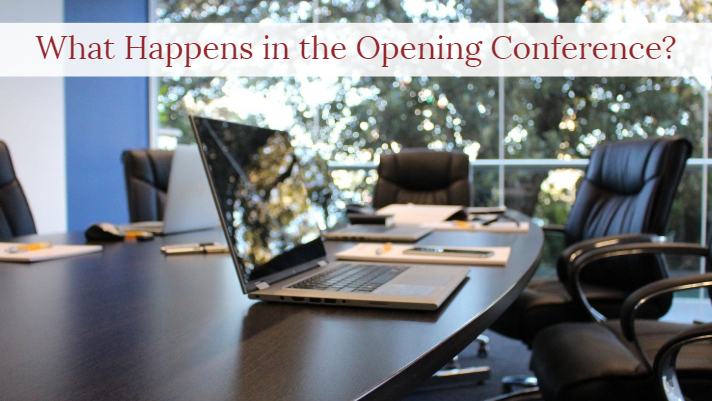What Happens in the Opening Conference?

For many clients, the opening mediation conference is a puzzle. They may be confused — even alarmed — that you are not making an impassioned presentation of their case. They may want to argue with the other side or express their opinion.
By explaining the opening conference to your client in advance, you can avoid having the mediation derailed from the get-go. Here’s how I explain the opening conference to people.
Written by Lee Wallace,
What is the Opening Conference?
Most mediators start the mediation with a joint conference. If everyone will fit into the plaintiff’s room, I have people congregate in that room first.
First Things First
At the opening conference, I explain how the mediation process works, In Georgia, there are rules that require me to make certain statements as a mediator, which I will do up front before we get started.
Everyone at the meeting will also sign a document setting out the rules for how mediation will be conducted.
The Attorneys Will Make Brief Statements
After the preliminaries, I ask the attorneys to give some brief remarks about the case, if they want to. I like to know as much about the case as possible before we get started, so I appreciate any comments the attorneys make. Your attorney may make a full-blown presentation or may elect to say very little, especially where he has provided me with information about the case in advance. Either choice is normal.
Don’t be surprised if your attorney does not argue your case during the opening conference. Mediation is a time for working together with the other side to resolve the case; your attorney is saving his passionate closing argument for trial.
As the mediator, I may have some questions about the case, the facts of the case, or the arguments the parties are making.
Your Chance to Talk
I also will ask you whether you want to say anything to the group. The opening conference is your once-in-a-litigation opportunity to say what you think without it being used at trial. This is your chance to talk about your feelings and how the incident or the litigation has affected you, or to remain silent if that feels more comfortable to you. Neither decision is wrong; it’s a personal choice, entirely up to your attorney and you.
If you decide to say something, keep in mind that the goal of the day is to solve the litigation, and you want the words you say to help with that process.
I get it — sometimes people come into litigation with a lot of anger. When you face the person on the other side, it can be sorely tempting to lash out.
But you have to remember what your mediation goal is. You want to settle the case. You want to end the litigation. Angry words can derail the mediation before we even get started. If it takes biting back some bitter words during the opening conference, at the end of the day you will be glad you did.
I will give each person in the room the chance to talk. Sometimes they do, and sometimes they don’t. Either way is completely acceptable.
Why We Might Not Have an Opening Conference
In rare situations, it might make more sense to start without an opening conference. For example, if the tensions are running high between the parties, it might be counterproductive to put everybody in the same room. In the case, I will meet each party individually to discuss the mediation, how we will conduct it, and to get everyone to sign the mediation agreement.
One of the great benefits of mediation, though, is that the parties can work together for the first time since the lawsuit was filed. Normally, then, it makes sense to bring everyone together for an opening conference.
Schedule a mediation w/ Lee Wallace
